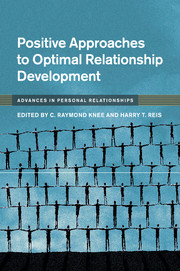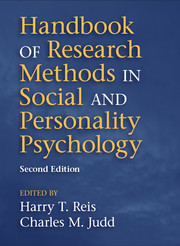84 results
Handbook of Research Methods in Social and Personality Psychology
- Coming soon
-
- Expected online publication date:
- January 2025
- Print publication:
- 31 October 2024
-
- Book
- Export citation
Protein modifications due to homogenisation and heat treatment of cow milk
-
- Journal:
- Journal of Dairy Research / Volume 90 / Issue 1 / February 2023
- Published online by Cambridge University Press:
- 23 February 2023, pp. 58-65
- Print publication:
- February 2023
-
- Article
-
- You have access
- Open access
- HTML
- Export citation
Chapter 6 - Writing about Methods
- from Part II - Parts of Articles
-
-
- Book:
- Guide to Publishing in Psychology Journals
- Published online:
- 19 November 2018
- Print publication:
- 06 December 2018, pp 65-81
-
- Chapter
- Export citation
40 - Whither Relationship Science?
- from Part XI - Conclusion
-
-
- Book:
- The Cambridge Handbook of Personal Relationships
- Published online:
- 11 June 2018
- Print publication:
- 21 June 2018, pp 553-564
-
- Chapter
- Export citation
Contents
-
- Book:
- Positive Approaches to Optimal Relationship Development
- Published online:
- 05 April 2016
- Print publication:
- 08 April 2016, pp v-vi
-
- Chapter
- Export citation
Part III - Effective interventions
-
- Book:
- Positive Approaches to Optimal Relationship Development
- Published online:
- 05 April 2016
- Print publication:
- 08 April 2016, pp 279-349
-
- Chapter
- Export citation
1 - Promoting intimacy: strategies suggested by the appetitive side
- from Part I - Major theoretical perspectives
-
-
- Book:
- Positive Approaches to Optimal Relationship Development
- Published online:
- 05 April 2016
- Print publication:
- 08 April 2016, pp 3-29
-
- Chapter
- Export citation
Figures and tables
-
- Book:
- Positive Approaches to Optimal Relationship Development
- Published online:
- 05 April 2016
- Print publication:
- 08 April 2016, pp vii-vii
-
- Chapter
- Export citation
Part I - Major theoretical perspectives
-
- Book:
- Positive Approaches to Optimal Relationship Development
- Published online:
- 05 April 2016
- Print publication:
- 08 April 2016, pp 1-100
-
- Chapter
- Export citation
Part II - Concepts and mechanisms
-
- Book:
- Positive Approaches to Optimal Relationship Development
- Published online:
- 05 April 2016
- Print publication:
- 08 April 2016, pp 101-278
-
- Chapter
- Export citation
Contributors
-
- Book:
- Positive Approaches to Optimal Relationship Development
- Published online:
- 05 April 2016
- Print publication:
- 08 April 2016, pp viii-x
-
- Chapter
- Export citation
Preface
-
- Book:
- Positive Approaches to Optimal Relationship Development
- Published online:
- 05 April 2016
- Print publication:
- 08 April 2016, pp xi-xiv
-
- Chapter
- Export citation
Index
-
- Book:
- Positive Approaches to Optimal Relationship Development
- Published online:
- 05 April 2016
- Print publication:
- 08 April 2016, pp 350-351
-
- Chapter
- Export citation
Copyright page
-
- Book:
- Positive Approaches to Optimal Relationship Development
- Published online:
- 05 April 2016
- Print publication:
- 08 April 2016, pp iv-iv
-
- Chapter
- Export citation

Positive Approaches to Optimal Relationship Development
-
- Published online:
- 05 April 2016
- Print publication:
- 08 April 2016
Contents
-
- Book:
- Handbook of Research Methods in Social and Personality Psychology
- Published online:
- 05 June 2014
- Print publication:
- 24 February 2014, pp v-vi
-
- Chapter
- Export citation
Subject Index
-
- Book:
- Handbook of Research Methods in Social and Personality Psychology
- Published online:
- 05 June 2014
- Print publication:
- 24 February 2014, pp 736-744
-
- Chapter
- Export citation
Part one - Design and Inference Considerations
-
- Book:
- Handbook of Research Methods in Social and Personality Psychology
- Published online:
- 05 June 2014
- Print publication:
- 24 February 2014, pp 9-98
-
- Chapter
- Export citation
Part three - Data Analytic Strategies
-
- Book:
- Handbook of Research Methods in Social and Personality Psychology
- Published online:
- 05 June 2014
- Print publication:
- 24 February 2014, pp 471-710
-
- Chapter
- Export citation

Handbook of Research Methods in Social and Personality Psychology
-
- Published online:
- 05 June 2014
- Print publication:
- 24 February 2014

